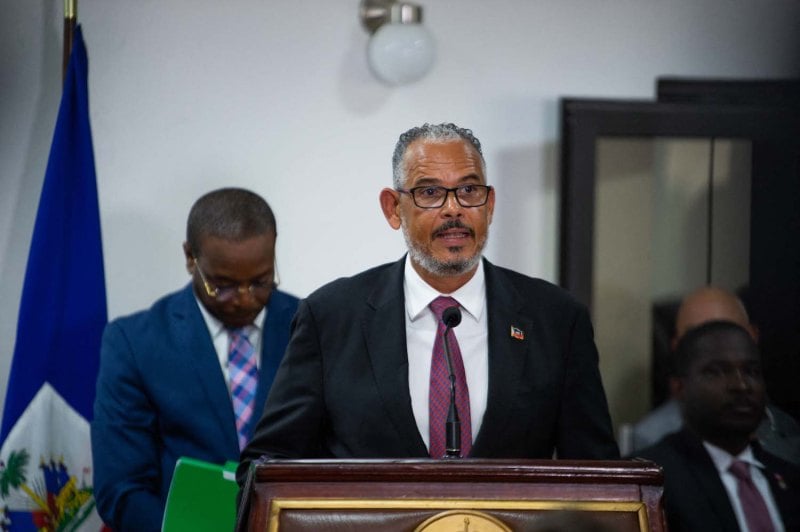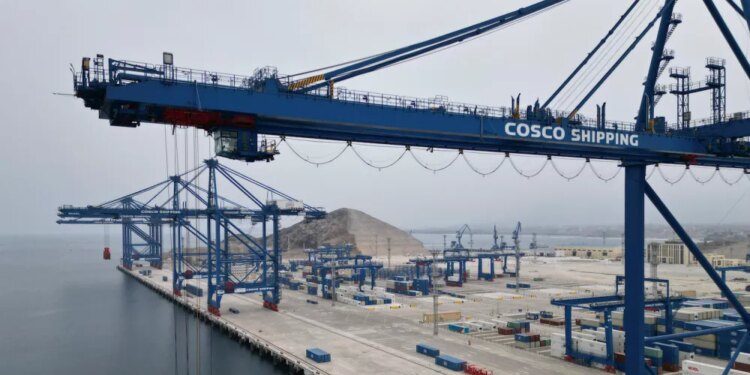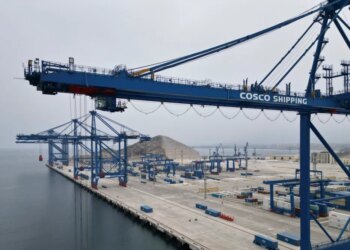Welcome back to Foreign Policy’s Latin America Brief.
The highlights this week: A Chinese-backed megaport opens in Peru, violence rocks Brazil’s capital ahead of the G-20 summit, and Haiti’s interim prime minister gets the boot.
Sign up to receive Latin America Brief in your inbox every Friday.
Sign up to receive Latin America Brief in your inbox every Friday.
Chinese President Xi Jinping and U.S. President Joe Biden are making rare trips to Latin America this week, both with a first stop in Peru. Although the country generally keeps a low geopolitical profile, it is friendly to free trade and is the host of the annual Asia Pacific Economic Cooperation (APEC) summit this year.
The APEC summit is catching Peru at a moment of relative economic optimism. The country is emerging from a recession that followed political tumult. In December 2022, a coup attempt by then-President Pedro Castillo led to his removal from office.
Castillo’s successor, Dina Boluarte, faced mass protests and responded with a harsh crackdown; her approval rating today stands under 10 percent. As Boluarte clashed with Peru’s Congress, some analysts speculated that she might leave office early.
But she survived, and this year, Peru has seen more positive investor sentiment and economic growth. “It’s quite clear now that the Boluarte administration is going to stay until 2026,” which is the end of its term, the Economist Intelligence Unit’s Andrea Moncada said. “[T]he messaging from the government is quite business-friendly.”
If Peru’s economic upswing has a symbol, it is the $3.5 billion, Beijing-backed deepwater port complex being built in the small city of Chancay. The first phase of the port opened on Thursday.
The port—which is part of China’s Belt and Road Initiative (BRI) and is run by a Chinese firm, Cosco Shipping—will accommodate ships larger than those that can fit through the Panama Canal. The Chancay port could also reduce shipping times between South America and Asia by 10 to 20 days, Peru’s transport minister told reporters this week. Many ships will no longer need to stop in Mexico or the United States.
Peru anticipates a sharp uptick in its agriculture exports thanks to the new port, and officials predict that China will jump from accounting for 5 percent of its agricultural exports to much higher, and Brazilian firms plan to use the port, too.
Peru is reaping the benefit of a nonaligned foreign policy that courts both the United States and China, said political analyst Gonzalo Banda. The port’s opening was like “an oasis in a desert” in terms of investment, he added.
The United States sees things differently. Retired Gen. Laura Richardson, who led the U.S. Southern Command, has voiced concern that the port could be used to dock Chinese warships. Richardson also lobbied against a proposal for a Chinese port in southern Argentina.
The Chancay port is slated for commercial use only, said María Rosa Villalobos, the economics editor of Peruvian newspaper El Comércio. “In the contract with Cosco Shipping and the government there is not—at least as far is as known—any military implication,” she said.
Still, reports suggest that China may be throwing its weight around in Peru in other ways. Unnamed sources told Nikkei that Peru boycotted the representative that APEC member Taiwan originally planned to send to this week’s summit. Although Taiwan will send another envoy, the move sent a political message. (Peru’s office in Taipei did not immediately offer comment to Nikkei.)
To many Peruvian analysts, there are more pressing concerns about the port than great-power competition. For one, construction is running behind on the roads and railways required to bring goods to the port. “The port is there, but the infrastructure to support its operations is not,” Moncada said.
The Chancay port may be an increasingly rare BRI project in Latin America. As China addresses its own domestic economic struggles, its investments in the region have become smaller in scale, journalist Mie Dahl wrote in Foreign Policy this week.
For now, Peruvians are taking the win. “This is an excellent opportunity for Peru in terms of business,” Villalobos said.
Friday, Nov. 15: The Ibero-American Summit, which convenes officials from Latin America, Spain, and Portugal, wraps up in Ecuador.
Sunday, Nov. 17, to Tuesday, Nov. 19: Biden visits the Brazilian Amazon and Rio de Janeiro, holding bilateral talks with Brazilian President Luiz Inácio Lula da Silva.
Monday, Nov. 18, to Tuesday, Nov. 19: Brazil hosts the G-20 leaders’ summit.
Wednesday, Nov. 20: Lula holds bilateral talks with Xi.
Wednesday, Nov. 20: Italian Prime Minister Giorgia Meloni visits Argentina.
Violence ahead of the G-20. A man was killed on Wednesday night after two explosions outside Brazil’s Supreme Court in the capital, Brasília. The event put Brazilian security officials on alert days ahead of the G-20 summit in Rio de Janeiro.
Brazilian authorities said that the attacker tried and failed to enter the Supreme Court building before the explosions; police called the act a suicide bombing and said that investigations were still ongoing.
The man identified as the attacker previously ran unsuccessfully for local office as a member of former Brazilian President Jair Bolsonaro’s far-right Liberal Party; he had posted on social media warning of action against “shitty communists.” Bolsonaro and his supporters have long labeled the Supreme Court as a political enemy.
Trump’s top diplomat. U.S. President-elect Donald Trump’s secretary of state pick would be a familiar face for many Latin Americans. Florida Sen. Marco Rubio, who is Cuban American, has long been outspoken about U.S. policy in the region. He has taken hawkish positions against autocrats in Cuba, Nicaragua, and Venezuela, and has warned against rising Chinese engagement in the Western Hemisphere.
In recent years, Rubio’s stances have fallen along ideological lines. He has criticized left-wing administrations in Brazil and Colombia. In April, he hailed “opportunities for collaboration” with a list of countries that mostly had conservative leaders, such as Argentina, Ecuador, and Paraguay. The outgoing U.S. State Department leadership, by contrast, has been willing to work with democratic leaders of all stripes.
If confirmed, Rubio could pursue a significant increase in Washington’s economic engagement with Latin America. He has argued for an expanded role of the U.S. lender at the International Development Finance Corporation and bills to incentivize nearshoring.
Rubio’s nomination has already reverberated through Latin American capitals. “Last night, these people in [the Maduro regime] didn’t sleep,” said Rafael de la Cruz, the U.S. director of the office of Venezuelan opposition leaders María Corina Machado and Edmundo González Urrutia. “I can tell you that they are really, really worried about the nomination of Sen. Rubio.”
From the left: Selton Mello, Fernanda Torres, and Walter Salles attend the red carpet of the movie “I’m Still Here” at the 81st annual International Venice Film Festival on Sept. 1.
From the left: Selton Mello, Fernanda Torres, and Walter Salles attend the red carpet of the movie “I’m Still Here” at the 81st annual International Venice Film Festival on Sept. 1.Alberto Pizzoli/AFP via Getty Images
Oscar hopefuls. Latin American countries have made their submissions to the Best International Feature Film category at the 2025 Academy Awards. Peru’s pick is an Indigenous mystery drama, while Colombia’s follows the story of a woman boxer raised in a rural community without a television.
While some of these films are art-house productions without wide releases in their home countries, Brazil’s submission debuted in theaters last weekend and quickly became the top film in the country. I’m Still Here tells the true story of a woman and her family’s experience during the country’s 1964-1985 military dictatorship.
I’m Still Here won Best Screenplay at the Venice Film Festival earlier this year, sparking speculation that an Oscar nod could be next.
Walter Salles, the director of I’m Still Here, previously competed for Best Foreign Language Film at the Oscars with Central Station. He lost to the Italian wartime drama Life is Beautiful. What year was that?
1999
2005
2010
2015
Salles is also well-known for The Motorcycle Diaries, which depicts the early life of Che Guevara and won an Oscar for Best Original Song.

Haitian Prime Minister Alix Didier Fils-Aimé speaks during his installation ceremony in Port-au-Prince, Haiti, on Nov. 11.
Haitian Prime Minister Alix Didier Fils-Aimé speaks during his installation ceremony in Port-au-Prince, Haiti, on Nov. 11.Clarens Siffroy/AFP via Getty Images
Haiti’s political and security crises intensified over the past week. The country’s transitional governing council fired its leader while gunfire at the Port-au-Prince airport prompted U.S. airlines and even United Nations aid planes to suspend flights.
Garry Conille, a former U.N. official who was serving as Haiti’s interim prime minister, was sacked by the transitional council last Friday amid disagreements and corruption allegations within the body. Conille sought to remove three council members that a government anti-corruption agency accused of graft, charges which they rejected.
On Sunday, the council named businessman Alix Didier Fils-Aimé as Conille’s replacement. Then, on Monday, gunshots hit three different airplanes at the Port-au-Prince airport. The U.S. Federal Aviation Administration suspended all flights to Haiti for 30 days, while the U.N. announced it would suspend aid flights, though it was not immediately clear for how long.
The aid cutoff comes after the U.N. World Food Program announced in September that one in two Haitians experiences acute hunger. The poorly staffed and Kenyan-led Multinational Security Support Mission in Haiti, meanwhile, has been unable to wrest control of the capital back from gangs.
The week’s events led to new calls for action from neighboring countries. On Wednesday, the Organization of American States (OAS) backed a previous call from Haiti’s transitional council for the U.N. to intervene in Haiti with an official peacekeeping mission. The Vatican quickly followed suit in endorsing the appeal.
Haiti’s violence, instability, and humanitarian crisis “threaten the safety of the Haitian people, hinder a return to democratic governance, and obstruct the path toward long-term social and economic development, and could jeopardize security in the region,” the OAS’s permanent council said.
Source link : http://www.bing.com/news/apiclick.aspx?ref=FexRss&aid=&tid=675b0eab3666427dbcbbfaeb91b6ec27&url=https%3A%2F%2Fforeignpolicy.com%2F2024%2F11%2F15%2Fperu-port-chancay-china-bri-economics-shipping-us%2F&c=6285794129345895448&mkt=en-us
Author :
Publish date : 2024-11-14 19:00:00
Copyright for syndicated content belongs to the linked Source.









